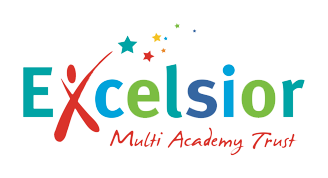Oracy
Oracy Policy
Excelsior Multi-Academy Trust
Intent
We believe spoken language to be fundamental to the achievement of our pupils. To ensure we are teaching oracy skills across the curriculum and providing our children with a range of oracy opportunities, and a variety of audiences, we have partnered with Voice 21 (a charity which aims to improve the teaching of oracy in schools) for the academic year 2019–20. This project will ensure that teachers and leaders are equipped with the skills to develop oracy for teaching and learning, to plan for talk across the curriculum and to elevate speaking beyond the classroom. The project will build a culture of oracy within our school to support and develop our pupils’ confidence, spoken language and written outcomes across and beyond the curriculum.
Our aim is to enable the children improve their levels of oracy so that all pupils are able to communicate effectively and confidently in front of any type of audience. These skills are being encouraged in every area of our curriculum as good communication skills can enhance every type of learning. The children are encouraged to explore ideas through talk; challenge each other’s opinions and develop their own reasoned arguments, as well as talking in full sentences with a clear and confident voice.
Many of our pupils start early school life without the oracy skills relevant for their age. We strive to develop spoken language skills through the taught curriculum, the hidden curriculum, playtimes and lunchtimes, extra-curricular activities and the whole ethos of the school.
Respectful and productive relationships between all who form part of the school community are crucial aspects of this ethos. As a staff, we therefore foster good communication amongst ourselves and with our pupils, their parents and carers, and with the wider community. We place a high priority on supporting the development of good speaking and listening skills amongst our pupils.
Our oracy curriculum will enable children to:
- speak with confidence, clarity and fluency;
- recognise the value of listening;
- be confident in the value of their own opinions and to be able to express them to others;
- adapt their use of language for a range of different purposes and audiences, including using Standard English;
- sustain a logical argument and respond to others appropriately;
- concentrate, interpret and respond appropriately to a wide range of listening experiences;
- be open-minded, to value the contribution of others and to take account of their views;
- appreciate the diversity of languages, dialects and accents in the school and value the experience and contributions of children with a wide variety of linguistic backgrounds;
- share their learning in an engaging, informative way through formal presentations.
Implementation
Correct spoken language is fundamental to learning. From the first days in school, speaking and listening play a large part in a child’s progress in all curriculum areas and teachers plan to develop these skills in a wide variety of ways. We aim to develop and encourage fluent speakers, who can confidently articulate their ideas in a wide range of situations.
Pupils should have a range of planned oracy experiences (this is not an exhaustive list), which include:
- drama;
- talking partners;
- listening to stories;
- reading lessons;
- preparation for writing;
- visiting speakers;
- giving and receiving instructions;
- paired/collaborative work;
- problem solving in maths;
- presentation of learning;
- plan, do review sessions.
It should also be recognised that there are opportunities for children to develop their oracy skills outside of the curriculum, including (but not limited to):
- assemblies, including class assemblies;
- school council and other pupil voice activities;
- topic showcase events;
- extra-curricular and year group productions;
- participating in cross-MAT events.
Inclusion
Children with additional needs are encouraged to take a full and active part in spoken language activities at a level appropriate for their needs. Targets are usually set by the class teacher, following the advice of our SENDCo, which are then worked on individually or in small groups. Some of our children have input from a speech therapist, and we welcome the expertise they bring to the school. Our EYFS teachers use the Wellcom toolkit, a speech & language intervention to develop our pupils’ oracy skills from the start of their school journey.
As a school we have a large number of pupils who have English as an additional language. Their experiences and knowledge provide us with a rich resource on which to draw for the benefit of the whole school. Visual prompts and signs written in the child’s first language may be used to develop vocabulary and encourage participation for early English speakers.
Our experienced TAs and Learning Mentors work with individuals or groups of children specifically in the areas of speaking, listening and collaboration. Sometimes this may be to address a SEND issue, at other times it may be to encourage social skills.
Impact
The impact of this policy will be evidenced through the monitoring of attainment and progress of all children by class teachers. Oracy skills will be assessed using the oracy framework. Each year group has oracy objectives which build on the preceding years’ study to ensure progression in this area as children move through the school. The Progression in Oracy document is available on the school’s website.
The English Lead, SLT, Head teacher and link Governor will be responsible for monitoring the impact of this policy and standards of spoken language across the school, through work scrutiny, planning scrutiny, learning walks and lesson observations and any other relevant monitoring activities.
It is every class teacher’s responsibility to ensure that this policy is adhered to.

